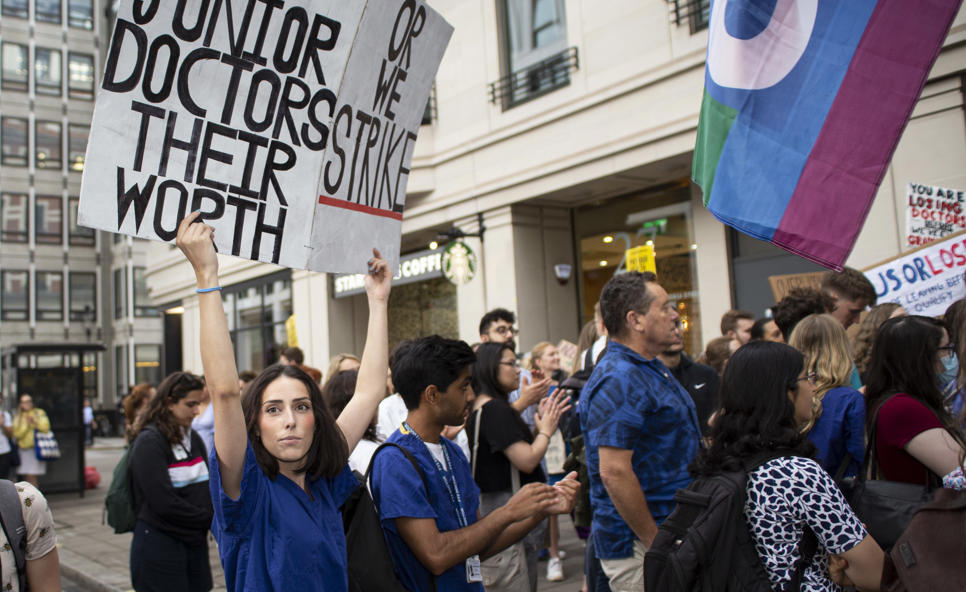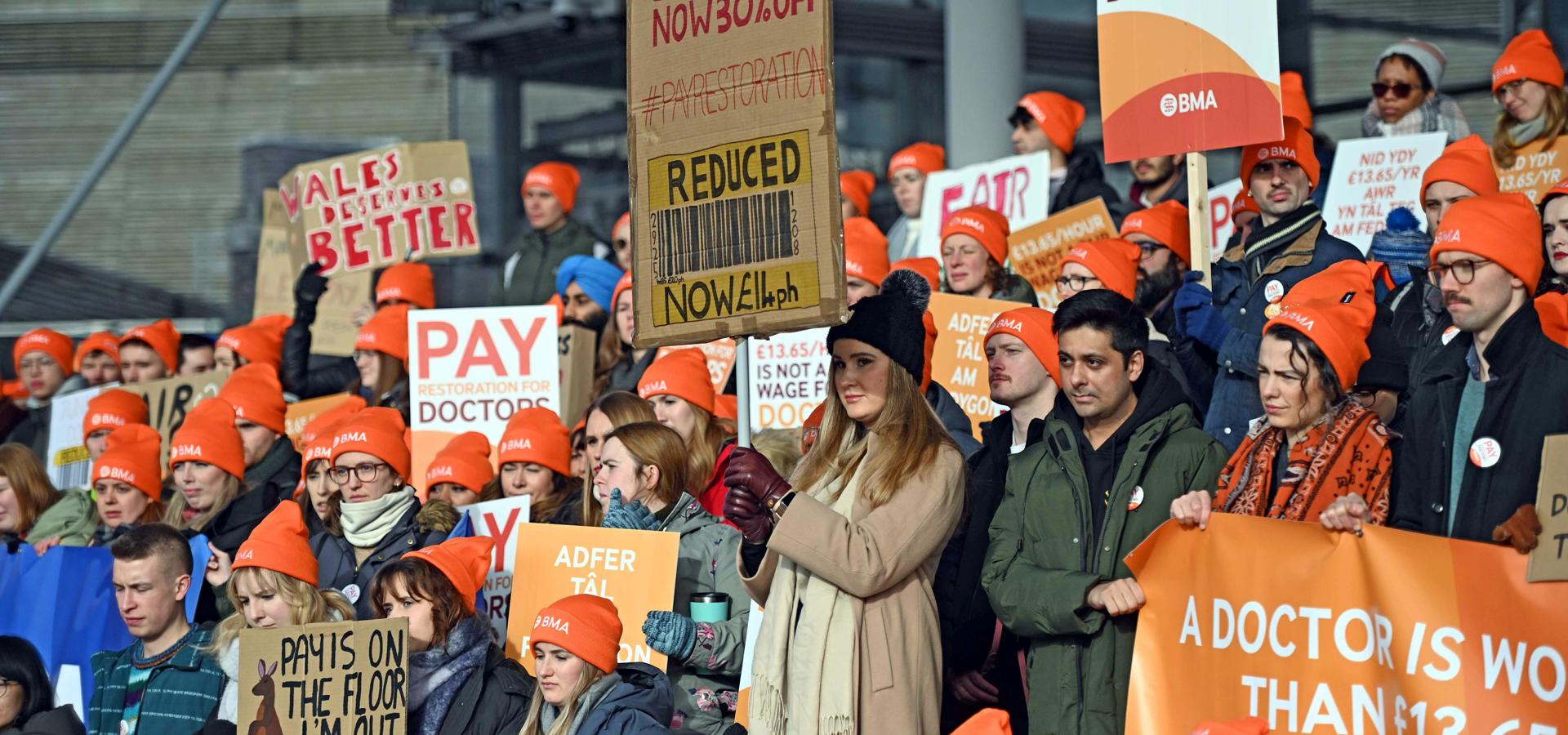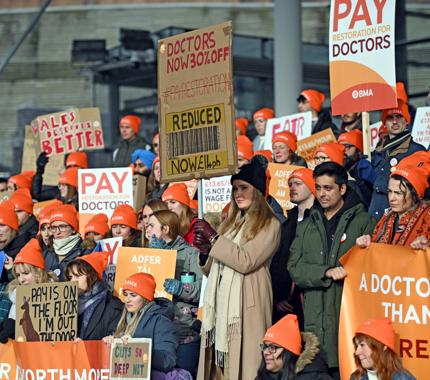Negotiations on a reformed resident doctor contract in Wales have concluded. It’s now time for you to have your say on the offer.
Read more about contract reform for resident doctors in Wales and join one of our engagement events before the referendum opens on 24 November.
DDRB recommendations 2025/26
The Welsh Government has announced that it is accepting the recommendations of the pay review body (DDRB) in full. This means that for the 2025/26 pay year, resident doctors in Wales will receive a pay uplift of 4% plus £750. This works out as a pay uplift of between 5.1% and 6.3%, or 5.4% on average. See the full pay scale.
This award is unacceptable and makes it clear that, despite the reforms secured last year, the DDRB is still failing to understand the value of doctors.
It does not come close to our expectations in terms of providing a clear and timely path to pay restoration, and we have made this clear to the Cabinet Secretary for Health and Social Care.
Why we are calling for full pay restoration
Since 2008/09, resident doctors in Wales have experienced a 20.8% reduction in average real terms pay. The strike action we took last year secured us a 12.4% pay rise for 2023/24, as well as important changes to the DDRB process. As the graph below shows, this pay increase, together with a further above-inflation uplift for 2024/25 (in line with DDRB recommendations), represents meaningful progress towards full pay restoration. However, it's clear we still have some way to go.
This year (2025/26), our pay has been uplifted by 4% plus £750. That means the average pay uplift of 5.4% for a resident doctor in Wales is barely 2% above the forecast inflation figure for this year of 3.2%. As a result, our pay is forecast to remain on average 19.1% lower than it was in 2008/09. At this rate, it would take us 11 more years to reach full pay restoration. However, we have now concluded contract negotiations which include a 4% additional investment and representing a possible further step on our journey to full pay restoration.
How we're responding
Shortly after the 2025/26 pay award announcement, we met with the Cabinet Secretary for Health and Social Care. In the meeting, we were very clear that the pay award does not do enough to continue our journey to full pay restoration.
We reiterated this message in a letter to the Cabinet Secretary, reminding him of the Welsh Government’s commitment to full pay restoration. In the letter, we also called for the resignation of the current DDRB board members, given their clear inability or unwillingness to deliver on the reforms needed to ensure fair pay for doctors and address years of pay erosion.
Resident doctors in Wales currently work under the 2002 contract. As part of the 2023/24 pay deal, we agreed to re-enter contract negotiations with the Welsh Government and NHS Wales employers. These talks have now concluded and it’s time for you to have your say on the offer. This offer includes elements that improve pay for resident doctors and an additional 4% investment on top of the pay award for 2025/26.
The referendum on whether to accept the offer will run between 24 November and 15 December.
Read more about the contract offer
What you can do
Make sure your details are up to date
It’s vital that we have up-to-date contact details so that we can keep you informed about contract negotiations, ensure you have a vote in any pay or contract referendum, and contact you quickly if a ballot for strike action becomes necessary. Staying connected helps us stay organised and maintain the leverage required to secure a positive outcome.
Become an activist or an active member

Activist
- Be the voice of your colleagues and champion local campaigns and initiatives
- Support BMA campaign activities, speak to members and arrange local workplace meetings
- Advocate for colleagues and highlight any workplace issues to LNC reps
- Encourage doctors to join the BMA and increase our collective strength

Active member
- Stay connected and engaged with the BMA without formal accreditation or training
- Provide feedback to the LNC reps on workplace issues
- Share BMA communications and information
- Support campaigns and encourage new members
Our pay campaign so far
2023/24: Delivering change through strike action
Our three rounds of strike action in 2024 forced the Welsh Government back to the negotiating table. After intense negotiations, we were pleased to reach a final deal which 96% of you voted to accept. This deal included an extra 7.4% uplift for all resident doctor pay points, bringing the total pay award for 2023/24 to 12.4%.
This revised pay offer also secured a commitment from the Welsh Government to work with us on agreeing changes to the current study budget and study leave system in Wales, as well as a recommitment to the provisions set out in the NHS Wales fatigue and facilities charter.
We also agreed to re-enter contract negotiations with the Welsh Government, with the ambition of reaching an agreement that would be put to members for implementation in 2025/26. We made it clear that any renegotiation of the rejected 2022 proposals must address the major concerns members raised around pay systems and working hours, and must include appropriate investment.
2024/25: Continuing the path to pay restoration
For the 2024/25 pay year, the Welsh Government announced its acceptance of the pay review body’s (DDRB) recommendations on pay. This meant that resident doctors’ pay increased by 6% + £1,000; an in-year uplift of between 7.6% and 9.3% to our pay. This pay award was above RPI and therefore continued to restore our pay.
In a survey which we launched following the 2024/25 pay award announcement, you told us you were broadly satisfied. Because of this, and the fact that the uplift continued our path to full pay restoration, we felt that the time was right to bank this pay uplift, further build up our organising capacity, and look at securing an improved contract for resident doctors working in Wales.

BMA strike fund - donate now
A strike fund is available to subsidise members in serious financial difficulty who otherwise couldn’t afford to take part in any future rounds of strike action.
The strike fund is supported through voluntary donations to make available to doctors in need.



